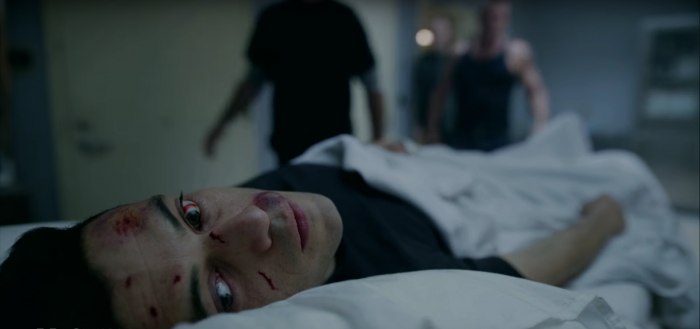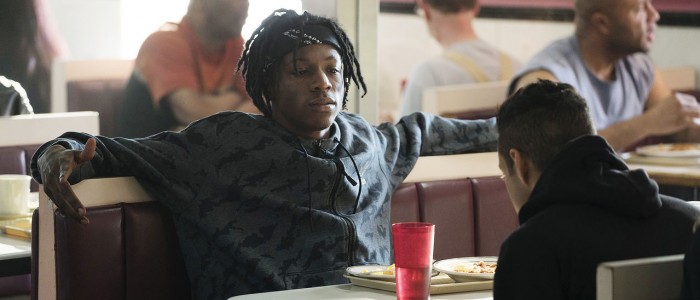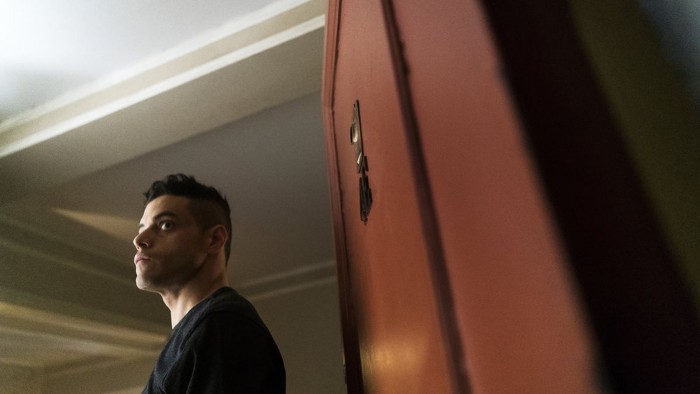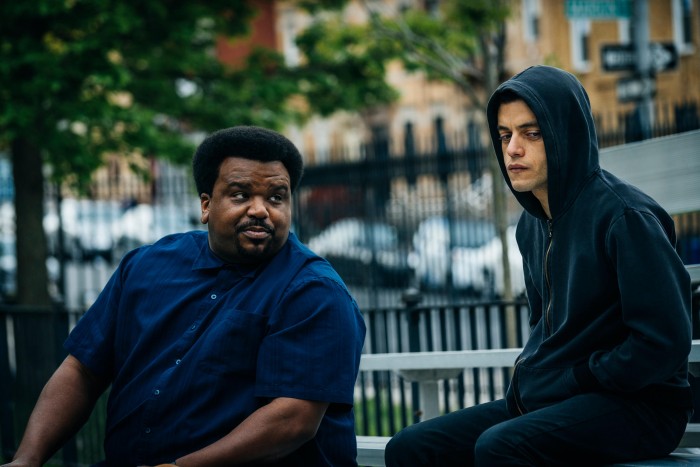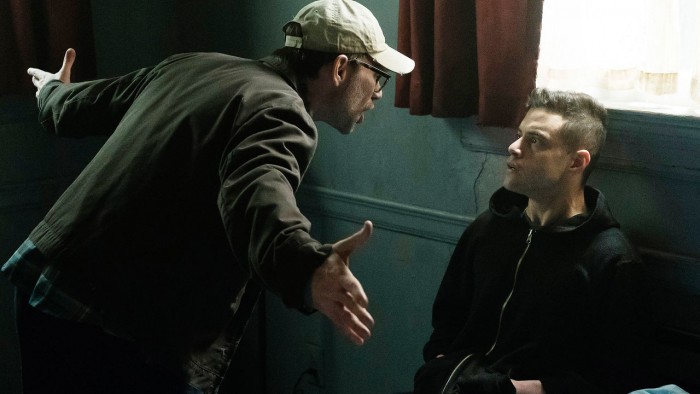'Mr. Robot' Season 2's Big Twist Explained By Sam Esmail
Last night's episode of Mr. Robot, "eps2.5h4ndshake.sme," featured a pretty big twist that left some fans upset and others feeling it was too obvious all along. Our own Corey Atad has already offered a significant analysis of the episode, but I wanted to take a deeper look and also find out what series creator Sam Esmail has to say about the intention and response.
It should be noted that the following post delves into major spoilers for season 2 of Mr. Robot up through last night's episode "eps2.5h4ndshake.sme." If you haven't watched the August 17 episode yet, please bookmark this post for a later time.
The Big Mr. Robot Season 2 Twist
Mr. Robot season 2 episode 7 ("eps2.5h4ndshake.sme") ends with the big reveal that much of what we've seen from Elliot's story this season did not happen the way we thought it did.
Some people watching are bound to feel hurt that the series has deceived them, and the show even acknowledges this. Through voiceover, Elliot explains: "Please don't be mad at me too long. This will be the last time I keep things from you. I promise." We can't believe that promise because this has always been a show about an unreliable narrator. But knowing that fact should be enough for most fans of the series.
In July, star Rami Malek told Rolling Stone about his reaction to learning about the plot of season 2:
My first response was, 'Are you sure you want to do this?' Sam was like, 'It may fall flat on its face. But I think it's going to work.'
Now series creator Sam Esmail tells Hitfix that he is not going for "gotcha moments or shocking the audience, but we're in it for interesting reveals and deepening and enriching Elliot's experience."
The show is about mystery, and there will always be questions and we won't actually see the full picture all of the time. Having said that, if we can't invest in what is happening and what is going on, that would become very frustrating, to the point where you wouldn't feel any stakes. That was the test we ran through with this idea: is this actually happening to him? Is what he's experiencing still real? And can the audience still buy into this after the reveal? Those answers were obviously yes: the events that we saw were still very much real, and the consequences of them are real, and what Elliot went through is real. It's just the coping mechanism he used was not exactly what he saw. To me, it was definitely one of those things that prompted a real conversation. ... We felt that him going through his prison sentence in this way was more true to life to Elliot than actually having seen it as a prison.
Esmail explained that the idea for the twist came from how we've seen the character cope with problems in the past and the fact that he now feels betrayed by us from the first season.
We're always trying to stay as authentic to Elliot as possible, what he's going through. Knowing Elliot, from the very first episode, he definitely has interesting coping mechanisms. Even from the pilot, he has this ability to reprogram his life: E Corp was turned into Evil Corp. When we thought about him being in prison, what would be that coping mechanism, this came to mind. The other approach was his relationship to us — to his "friend" — and how we left him at the end of the first season. He basically didn't trust us anymore, he felt we were keeping things from him. So we wanted to develop that relationship as well. That was the one approach of, "This is what Elliot would do in this situation, to cope with being in prison," and then the other of keeping it from us because he felt betrayed by us from the first season.
We will find out what really happened to Elliot in prison; Esmail says "That's going to get revealed in a couple of episodes."
As with any mystery, you've got to start answering some questions. We will do plenty of question-answering in the back half, especially with all the things we set up in the first half of the season.
So, for now, we can try to piece together the puzzle ourselves. The first six episodes of the season painted a picture of Elliot trying to live off the grid and away from the fsociety madness. But it turns out he's been living this whole time in prison. Why Elliot is in prison is not revealed. It is hinted that Elliot is getting out of jail soon, which suggests that he is not in the slammer for a major crime like leading the fsociety hack of E Corp.
The story we were presented with this season was that Elliot had moved in with his mother and was maintaining a repetitive routine in an attempt to weaken the influence of Mr. Robot. When he's not attending his therapy or group sessions, Elliot spends most of his time hanging with his old neighborhood friend Leon (Joey Bada$$) in a shitty diner and on the local basketball court. In this episode, Leon was revealed to be a fellow prisoner who was watching Elliot's back for Dark Army hacker Whiterose (BD Wong). As for Whiterose, Esmail reveals, "Whiterose is the real person; [Minister] Zhang is the mask."
Joey Bada$$ didn't know about the big twist until he read it in the episode table read. The rapper-turned-actor tells GQ how he thinks Leon got involved in the Dark Army:
I'm sure he's done some wild shit. He might honestly just be a spy or an agent. That's what I'm starting to think. He's onto something, man. Wait until you see the last episode—it's like, Wait, what? And he's clearly not afraid to kill. He's definitely done it before. You don't just kill four people like that for the first time.
The Problem With Isolating the Main Character
The biggest problem with the prison set-up is that it takes Elliot out of the action and isolates him away from the rest of the characters and larger story. Fans overwhelmingly were turned off by Elliot's position of inaction. But Esmail argues that "it was very important for Elliot to address this incredibly internal conflict that sprung on him at the end of the first season: that he has an alter ego that he can't control."
...The isolation of him being in prison really helped that. It meant that we get to basically do this deep dive into his internal battle with his demons. There is not much else for him to do. He couldn't escape it. So it was great on that level. I knew it was going to be a polarizing choice to go in this direction with Elliot, but for whatever reason, it felt organic and natural.
Is Ray Really a Prison Guard?
The neighborhood basketball court is where Elliot meets Ray (Craig Robinson), who befriends him and persuades him to help him with his website. Elliot uses the opportunity to communicate with Darlene and write a program that fsociety will use to hack the FBI. This probably happened almost as we see it, with Elliot using Ray's internet-connected computer to communicate with and help Darlene. It makes sense that Elliot would use this chance to reach out to the outside world.
Elliot looks where he shouldn't have and discovers that Ray is running a black market website trafficking in drugs, weapons, and sex slaves. We have to assume at this point that Ray is probably a guard at the prison who is operating a black market trading ring of some kind.
Elliot is beaten by Ray's thugs (possibly other prison guards), and experiences a twisted sitcom dream before waking up in a hospital bed (probably the prison's hospital ward). Held captive in a small torture room by Ray's thugs (most likely solitary), Elliot is forced to help him fix the website. But Elliot uses the time to alert the FBI, who quickly come to arrest Ray. We can only assume that Elliot alerted the authorities about whatever backdoor operation he was running.
After Ray's operation is shut down, the neighborhood is none too happy. We see Leon take out a bunch of guys who were going to rough Elliot up, and which now suggests that Leon took out the white supremacist gang with a shank.
Guessing the Twists
Coming off of the major twists from the first season, many fans have been looking for the big twists in the second season. While I didn't see it coming, many die-hard fans guessed correctly that Elliot was in a prison or mental institution. And Esmail acknowledges that the fans are starting to second-guess the series, but explains his motivations:
One thing that we always do is we never want to cheat the audience. We never want it to be some extraordinarily contrived thing where we're basically lying to the audience and what they're seeing isn't actually happening, and we're fooling them. In doing that, and being honest with what is going on, even though the surroundings aren't actually what they are, we didn't really hide it that well, right? I didn't expect people to catch on from the very first episode, but I thought people would start to theorize and catch on. Look, a reveal is great when it's surprising, but it's terrible when it feels like a cheat. To me, the fact that some people who guessed it may not be surprised, it verifies that we didn't cheat anybody, because it adds up and makes sense to them still.
Is Tyrell Wellick Really Dead?
But what has become of Tyrell Wellick? Earlier in the season we saw a glimpse of Elliot awakening from a dissociative state on the phone, greeted on the other end by Tyrell. In another episode, Joanna gets a phone call from someone breathing heavily, who we were to believe was Tyrell. The episode also features Mr. Robot revealing to Elliot that he killed Tyrell, but can we trust this to be true? Esmail admits "That's a great question."
But I would put that question back to you: How much do you believe, given what you know about Mr. Robot, from what you've seen already? That's what we have to go on, and what Elliot has to go on. That's the intention: we know as much about Mr. Robot as Elliot does, and so we're so with him in that regard of whether to trust him or not. That's part of the journey you're going to have to go on.
As for what we can expect from the rest of the season, Esmail says that it will continue to focus on the internal struggle with Elliot, reiterating that "this is at heart about Elliot's emotional journey." If I were to guess, it would be that Tyrell is still alive, and Mr. Robot is lying to Elliot. After all, wouldn't that help advance the inner struggle at the core of this series?

